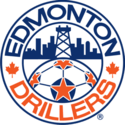Edmonton Drillers (1979–82)
 | |||
| Full name | Edmonton Drillers | ||
|---|---|---|---|
| Founded | 1979 | ||
| Dissolved | 1982 | ||
| Stadium |
Commonwealth Stadium (42,500) indoor: Northlands Coliseum | ||
| Chairman | Joe Patrone | ||
| Manager |
Hans Kraay, Timo Liekoski, Joe Patrone | ||
| League | North American Soccer League | ||
|
| |||
The Edmonton Drillers were a North American Soccer League team that played both outdoors and indoors from 1979 to 1982, at the peak of the league's success. The team was brought to Edmonton by local entrepreneur and Edmonton Oilers owner Peter Pocklington, after witnessing the strong support for Brian Rice's Edmonton Black Gold team in 1978. Previous to playing in Edmonton, the team was known as the Oakland Stompers, Hartford Bicentennials and Connecticut Bicentennials.
History
Joe Petrone was the Drillers general manager for their entire existence. The Drillers were coached in 1979 and 1980 by Hans Kraay, who brought a number of players with him from the Netherlands. After Kraay, Timo Liekoski took over as coach in 1981, while Patrone would serve as the team's final caretaker coach until the team folded at the end of the 1982 season.[1]
During the outdoor season, the Drillers played their home games at Commonwealth Stadium, but dwindling crowds during the final year saw the team move to much older and smaller Clarke Stadium, which led to even fewer fans attending the games. The Drillers played their two seasons of indoor soccer at Northlands Coliseum. The outdoor team was characterized by a strong defensive style of play, but their indoor style was built upon a run-and-go style of attack. Attendance for the outdoor games ranged greatly from 10,000 in the early stages of the franchise to 4,000 per game in 1982. By comparison, the more successful and profitable indoor games had attendances ranging between 5,000 and 7,000 paying fans per game in 1981 and 1982.[2]
The Drillers beat the Chicago Sting 5–4 in front of 16,257 fans at Chicago Stadium to capture the 1981 NASL indoor championship.[3]
Factors leading to collapse
In 1982, costs were skyrocketing for the team as they were with a number of the other NASL franchises. In Edmonton's case in particular, the following have been speculated as factors connected with the team's collapse: poor support by local media; difficulties stemming from a tricky deal with the owners of the Coliseum and Commonwealth Stadium relating to the attendance, concessions and parking at the indoor games; and as admitted by John Colbert, the Drillers' business manager in 1982, a business strategy that consisted a "top-down construction" for the team (i.e., bringing in expensive international players as opposed to developing cheaper local talent).[2][4]
Year-by-year results
| Year | League | W | L | T | Pts | Reg. Season | Playoffs | Average Attendance[5] |
|---|---|---|---|---|---|---|---|---|
| 1979 | NASL | 8 | 22 | — | 88 | 3rd, American Western | Did not qualify | 9,924 (16th of 24 teams) |
| 1979-80 | NASL Indoor | Did not participate | ||||||
| 1980 | NASL | 17 | 15 | — | 149 | 1st, American Conference, Western Division | Won 1st Round (Houston) Lost Conference Semifinal (Ft. Lauderdale) |
10,920 (15th of 24 teams) |
| 1980–81 | NASL Indoor | 10 | 8 | — | — | 2nd, Northern Division | Won 1st Round (Los Angeles) Won Semifinal (Vancouver) Won Championship (Chicago) |
3,975 (15th of 19 teams) |
| 1981 | NASL | 12 | 20 | — | 123 | 5th, Northwest Division | Did not qualify | 10,632 (13th of 21 teams) |
| 1981–82 | NASL Indoor | 13 | 5 | — | — | 1st, Northwest Division | Won 1st Round (Seattle) Lost Semifinal (San Diego) |
2,943 (11th of 13 teams) |
| 1982 | NASL | 11 | 21 | — | 93 | 6th, Western Division | Did not qualify | 4,922 (14th of 14 teams) |
External links
References
- ↑ NASL Jerseys: Edmonton Drillers Rosters Retrieved on 14 February 2009
- 1 2 Prince, Gerry. (2004) Pro soccer in Edmonton... a look through the years.
- ↑ New York Times Drillers Turn Back Sting For NASL Indoor Title 8 March 1981
- ↑ Edmonton Sun Drillers Kickin' and Grinnin' Retrieved on 14 February 2009
- ↑ NASL All-Time Attendance Retrieved on 14 February 2009